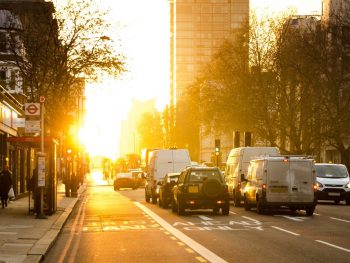Sadiq Khan calls for major reduction in car usage to avert congestion crisis
Mayor of London Sadiq Khan has warned that car usage in the capital must be “significantly” reduced to avoid a public health crisis, as he also revealed the cost of congestion.

Traffic on London’s roads cost the economy £5.1bn in 2021, or £1,211 per driver
Figures announced by City Hall today (11 January) show that car usage remained near pre-pandemic levels for much of the latter half of 2021 as travellers shunned public transport.
As a result, traffic on London’s roads cost the economy £5.1bn in 2021, or £1,211 per driver, according to Inrix figures.
In contrast, public transport ridership plummeted by 95% during the pandemic and is currently still significantly behind pre-pandemic levels, with buses at 70% of normal demand and Tubes at 55%.
Meanwhile, the share of trips by public transport in 2020 dropped 14% compared to 2019. This means the overall active, efficient and sustainable mode share for travel in 2020 – which covers the number of trips by walking, cycling and public transport, as a proportion of all trips – is estimated at 58.3% compared to 63.2% in 2019. So while the Mayor is trying to increase this key metric as part of his Transport Strategy, the figure has actually fallen by 5% over the pandemic, as a higher proportion of trips are now being driven.
That’s despite the fact that more than a third of car trips made by Londoners could be walked in under 25 minutes and two-thirds could be cycled in under 20 minutes.
The data also reveals that as London has grown in population, it has also experienced a huge increase in the number of miles driven on its roads between 2011 and 2019 – up by 3.5 billion miles to reach 22.6 billion miles. A staggering 18.7 billion miles were still driven in 2020, despite the Covid lockdowns.
And as the number of vehicle miles has increased, so too has the time lost by drivers to traffic. In 2017, the average London driver spent 144 hours per year sitting in traffic, according to TomTom data – almost 20 minutes extra for a 30-minute trip during the evening rush hour. In 2018, this increased to 147 hours, and in 2019, to 149 hours per year. And while traffic was much reduced in 2020, Londoners still spent an extra 15 minutes per 30 minute trip driving because of congestion – 115 hours per year.
This is supported by the Inrix data revealing the 148 hours lost a year by drivers on average in 2021, which cost the economy £5.1bn for the year.
Alongside the financial cost of congestion are the significant health impacts, including increased risk of respiratory diseases, and children growing up with stunted lungs. Pollution leads to 4,000 Londoners dying early each year, all of which increases the economic and resource burden on the health service.
Sadiq Khan said: “If we do not double down on our efforts to deliver a greener, more sustainable future we will replace one public health crisis with another – caused by filthy air and gridlocked roads. The cost to both Londoners and the capital cannot be underestimated, with days wasted stuck in traffic, billions lost to the economy and increased road danger and health impacts. Most traffic is caused simply by there being too great a demand for limited street space, meaning the only long-term solution can be to significantly reduce car use in favour of greener means of travel.”
Commenting on the research, TfL said it was determined to make sure that clean and reliable public transport plays a central role in supporting Londoners and the wider economy. And the Campaign for Better Transport has called for a sustainable funding deal for TfL to ensure it can keep investing in and promoting a return to public transport and active travel post-pandemic.
Think tank Centre for London has called for a rethink on measures – and continued its ongoing calls for a shift to road user pricing.
Chief executive Nick Bowes said: “Despite welcome interventions to encourage drivers to travel by other means, these latest figures suggest more needs to be done.
“The Congestion Charge, while world-leading when it was first introduced, is outdated and its effectiveness has diminished over time, particularly as it only affects those who drive through our city centre.
“The Mayor needs to be bold and introduce a simpler, smarter and fairer system of road user charging which replaces both the Congestion Charge and the Ultra Low Emission Zone. Such a scheme would tackle congestion, improve air quality and promote travel by public transport, walking and cycling, by charging drivers by the mile. It could also play a key role in filling the hole in Transport for London’s budget.”












